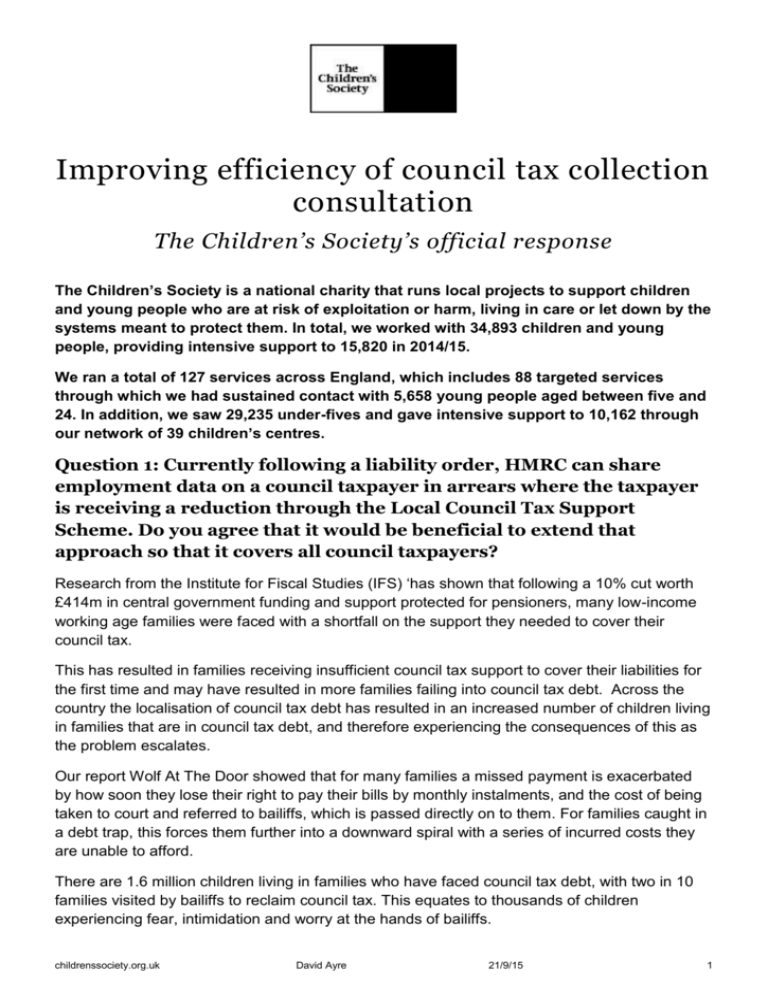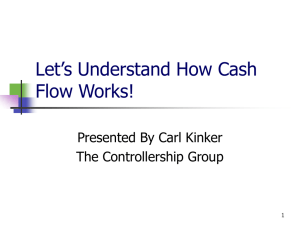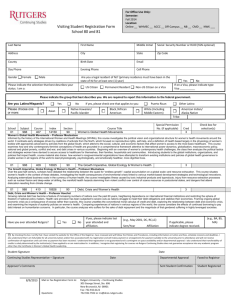DCLG Council Tax consultation
advertisement

Improving efficiency of council tax collection consultation The Children’s Society’s official response The Children’s Society is a national charity that runs local projects to support children and young people who are at risk of exploitation or harm, living in care or let down by the systems meant to protect them. In total, we worked with 34,893 children and young people, providing intensive support to 15,820 in 2014/15. We ran a total of 127 services across England, which includes 88 targeted services through which we had sustained contact with 5,658 young people aged between five and 24. In addition, we saw 29,235 under-fives and gave intensive support to 10,162 through our network of 39 children’s centres. Question 1: Currently following a liability order, HMRC can share employment data on a council taxpayer in arrears where the taxpayer is receiving a reduction through the Local Council Tax Support Scheme. Do you agree that it would be beneficial to extend that approach so that it covers all council taxpayers? Research from the Institute for Fiscal Studies (IFS) ‘has shown that following a 10% cut worth £414m in central government funding and support protected for pensioners, many low-income working age families were faced with a shortfall on the support they needed to cover their council tax. This has resulted in families receiving insufficient council tax support to cover their liabilities for the first time and may have resulted in more families failing into council tax debt. Across the country the localisation of council tax debt has resulted in an increased number of children living in families that are in council tax debt, and therefore experiencing the consequences of this as the problem escalates. Our report Wolf At The Door showed that for many families a missed payment is exacerbated by how soon they lose their right to pay their bills by monthly instalments, and the cost of being taken to court and referred to bailiffs, which is passed directly on to them. For families caught in a debt trap, this forces them further into a downward spiral with a series of incurred costs they are unable to afford. There are 1.6 million children living in families who have faced council tax debt, with two in 10 families visited by bailiffs to reclaim council tax. This equates to thousands of children experiencing fear, intimidation and worry at the hands of bailiffs. childrenssociety.org.uk David Ayre 21/9/15 1 We are supportive of alternative payment arrangements that allow families with children to pay their arrears back in an affordable way that minimises the detrimental emotional impact that the presence of an enforcement agent at the door can have. It is too often the case that families desperately struggling to make ends meet are not getting the opportunity to negotiate affordable repayments, and local authorities aggressively pursue repayments or take out liability orders which hang over families for months whilst they are on repayment plans. Making this data available even earlier in the process would be beneficial, as it would mean that it was not necessary for the matter to proceed to court. There are examples of council that have put in place improved debt collection policies to better protect families whilst still maintaining – and indeed being above average – in terms of their council tax debt collection rates. These include Islington Council, who have a policy of not referring enforcement agents (bailiffs) to households in receipt of council tax support, recognising the vulnerability that many claimants of council tax support will face. Alongside this, the council ensures that there are links to the council tax welfare provision in the Resident Support Scheme for residents who are facing difficulty. Recommendation 1: We would urge the Department to issue guidance to local authorities setting out that deductions from earnings or benefits should be the preferred payment method adopted for families with children who fall into arrears. This would mean that local authorities prefer these alternative collection policies that are available to them, putting in place affordable repayment plans for families, and only use bailiffs as a very last resort. There are examples of councils who take this approach whilst at the same time maintaining council tax collection rates, such as Islington. Recommendation 2: The National Standards for Bailiffs and Enforcement Agents should be updated to include all families with children under 18 in their recommended list of vulnerable groups. Question 2: Are there other legislative or data barriers to efficient council tax collection that, if addressed, would reduce the burden on council taxpayers? Where possible, please supply evidence of the reduction. Our national FOI of council tax collecting authorities showed that the vast majority did not collect data on the presence of children in a household, and as such were unable to use this information to determine the appropriate option for recouping arrears. Over two thirds of families we surveyed said they suffered with anxiety, stress or depression associated with their council tax bill. One of the main concerns was how quickly a missed payment can escalate. After just 14 days of falling behind, families can find themselves summoned to court, liable for extra charges and having enforcement action – such as bailiffs knocking at the door – started against them. Currently councils report their council tax collection rates to central government every year and this incentivises councils to refer unpaid debts to bailiffs rather than pursue other ways of collecting debts, such as deductions from benefits. These alternative methods of collecting council tax enable families to pay back their arrears over a longer period of time which may run childrenssociety.org.uk David Ayre 21/9/15 2 over more than one year – and therefore over more than one reporting cycle to central government. Joined-up action is needed from local authorities, central government and the Local Government Association to ensure that there is a measurable reduction in the impact that council tax debt has on children and young people. Recommendation 3: We believe that sharing data from child benefit claimants with local authorities so that they have an accurate picture of family composition would be beneficial. This would better allow local authorities to protect children by not sending bailiffs round to families with children. Our research has shown that using bailiffs has a particularly damaging impact on the emotional health and well-being of children. Recommendation 4: Collection reporting to Department for Communities and Local Government should be updated to include reporting on the number of households, with an attachment from benefits order to prevent councils being encouraged to use debt collection practices that are harmful to children. Question 3: Are there any data collection or sharing issues that the Government could usefully clarify or address? Our research highlighted that care leavers are a particularly vulnerable group at risk of council tax debt as they move into independent living and adulthood for the first time. Evidence from our own services shows how challenging care leavers can find managing their own budgets and how scary they found falling behind on their council tax. Many expressed concern as to how quickly bailiffs are sent round and felt the council should not move to this response so quickly, with bailiff visits being the cause of stress and sleepless nights for some of the young people we spoke to. ‘I was late making a payment and they sent me a reminder letter and they said if they had to send me anymore reminder letters then I have to go to court and they stopped my instalments. I got really worried and really panicky because I didn’t understand, I didn’t want to go to court’ Care leaver, age 21 Using the knowledge available to the Government and local authorities to ensure that this vulnerable group does not fall into problem debt as they move into independent living arrangements is of the utmost importance, and our interviews with young people in this situation have told us that managing and understanding council tax bills for the first time is frequently a challenge, and that they aren’t aware of their entitlements around exemption or support. Many expressed concern as to how quickly bailiffs are sent round and felt the council should not send bailiffs to these young people so quickly, with bailiff visits being the cause of stress and sleepless nights for some of the young people we spoke to. Recommendation 5: Each local authority has a duty of care to care leavers. We believe that to ensure that the transition from care to adult life is as smooth as possible, and to mitigate the chances of them falling into debt as they begin to manage their own finances, they should be exempt from paying council tax until they are 21. This is an issue that must be decided at a national level, as is the case for the student exemption. For more information please contact David Ayre, Policy Officer on david.ayre@childrenssociety.org.uk childrenssociety.org.uk David Ayre 21/9/15 3







